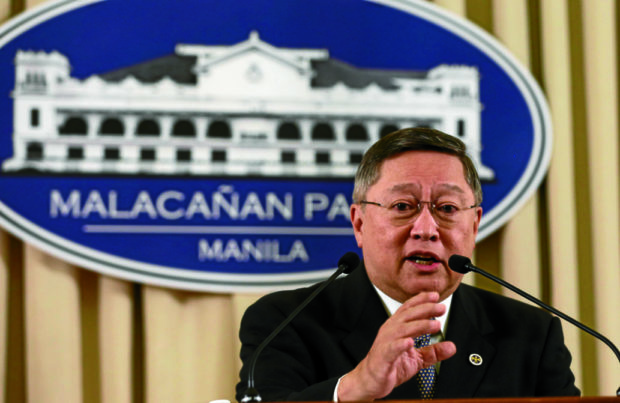Dominguez: Liquor, cigarette restrictions to stay as health top priority amid pandemic

Finance Secretary Carlos Dominguez III. File photo by JOAN BONDOC / Philippine Daily Inquirer
MANILA, Philippines — The government will keep the restrictions on liquor sale as well as withdrawals of cigarettes from factories for the rest of the extended lockdown period, as keeping Filipinos away from these “sin” products would not only keep them healthy but also protect them from getting inflicted with COVID-19, Finance Secretary Carlos G. Dominguez III said Monday.
As such, the liquor ban imposed by the national and local governments will stay in areas under enhanced community quarantine, while domestic cigarette production will remain on halt, save for a few lines churning out for exports.
Over the weekend, the Department of Finance (DOF) reported a slump in the year-to-date tax take from tobacco and alcohol, which the agency described as “consistent large excise tax collection drawers.”
During the period Jan. 1 to April 15, tobacco excise taxes fell 42.5 percent year-on-year to P33.19 billion, while collections from alcoholic drinks declined 26 percent to P17.85 billion.
This drop happened despite the higher tax rates slapped on these products since Jan. 1 under Republic Act No. 11346 which increased the levy on cigarettes, and RA 11467 jacking up taxes on alcohol, heated tobacco and vapes.
As tax collections dropped, the government increasingly turned to foreign loans from multilateral lenders and bilateral government partners to ensure that it can address the health and socioeconomic fallout from COVID-19.
Asked if the government may consider easing ECQ restrictions on these “sin” products to shore up badly needed government revenues to be spent for COVID-19 response, Dominguez replied: “No.”
Further asked if he referred to both products, the Finance chief replied: “Yes.”
“Sin taxes are imposed to discourage consumption of products that are detrimental to health. We do not wish to exacerbate the current health crisis,” Dominguez explained.
Last week, Dominguez said that he did not want the liquor bans lifted, but the government may exempt cigarettes from quarantine restrictions as smuggling of so-called “illicit” sticks increased after unscrupulous traders took advantage of dwindling supply of tax-paid packs.
Dominguez’s change of heart with regards to cigarettes came after a meeting with Health Secretary Francisco Duque III, who had advised that smoking may aggravate a respiratory ailment like COVID-19.
The fight against illicit cigarettes will be nonetheless continued by the so-called “strike team” of the bureaus of Internal Revenue (BIR) and of Customs (BOC), Dominguez said, adding that the country’s two biggest tax-collection agencies remained “vigilant” against such illegal activities.
The Center for Alcohol Research and Development (Card) Foundation Inc., whose members included Absolut Distillers Inc., Emperador Distillers Inc. and Ginebra San Miguel Inc., earlier appealed to totally lift the ban or relax it on certain hours during which stores may sell liquor.
“If this ban continues, the industry can no longer survive; a situation that can affect a large sector of the community… the alcohol beverage industry bears already the agony of declining market demand due to the imposition of high excise taxes on alcohol,” Card said in an April 16 letter to Trade Secretary Ramon Lopez.
As for cigarettes, manufacturers said in a report last week that “as a result of the enhanced community quarantine, it is likely the supply chain of illicit traders had also been disrupted.”
“Intelligence reports indicate that foreign workers in illicit factories returned home in late January. Because of the coronavirus outbreak, these foreigners stayed in their own country and local illicit factories remained non-operational. Moreover, the same intelligence reports also note that the acquisition cost abroad of illicit whites rose from $80 to $150 per master case in February, as illicit traders scrambled to buy inventory in anticipation of supply-shortages due to the outbreak of COVID-19,” tobacco firms said.
“Shortly before the March 16 lockdown, intelligence reports showed that illicit traders were ramping orders from foreign sources of illicit cigarettes which cause prices of imported cheap contraband (illicit whites such as Fort, Two Moon, Union, and DnB, etc.) to surge to $150 per master case,” they added.
Even as acquisition cost of imported illicit cigarettes was on the rise, they still remained cheaper than those in the formal market.
“Post-enhanced community quarantine, the tobacco industry projects that there will be a resurgence of illicit trade. The enhanced community quarantine resulted in job losses and a decline in incomes, which favor the consumption of low-priced and tax-unpaid illicit products,” industry players warned.
Specifically, they warned that “because of its long coastline and proximity to illicit tobacco products from neighboring countries, Mindanao will be a hotbed for the resurgence of illicit trade.”
“From April 1 to 15 alone in the midst of widespread lockdowns throughout the country, there were three seaborne enforcement operations in different parts of Mindanao. These illicit operations were jointly thwarted by the Armed Forces of the Philippines (PNP) and the BOC,” they noted.
Cigarette manufacturers noted that “in 2019, the legitimate tobacco industry counted that there were 1.8 enforcements per week” but “from March to mid-April 2020 (with the enhanced community quarantine), there were 10 enforcement actions or 1.6 raids per week.”
To address this problem, the tobacco industry urged “vigilance against illicit trade through sustained surveillance and enforcement activities by the government in partnership with the private sector to optimize tax revenues.”
Also, they sought to “allow the resumption of the production of exciseable products such as tobacco and alcohol so that excise taxes and value-added tax (VAT) may be generated by government to fund social welfare programs and for consumers not to turn to illicit products.”
JPV
For more news about the novel coronavirus click here.
What you need to know about Coronavirus.
For more information on COVID-19, call the DOH Hotline: (02) 86517800 local 1149/1150.
The Inquirer Foundation supports our healthcare frontliners and is still accepting cash donations to be deposited at Banco de Oro (BDO) current account #007960018860 or donate through PayMaya using this link.
